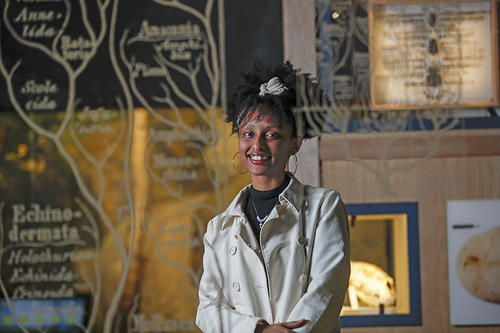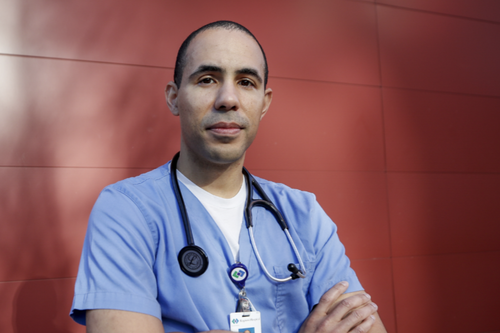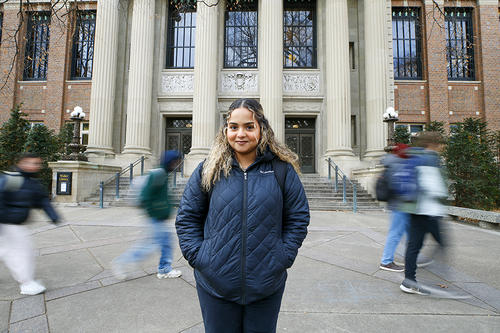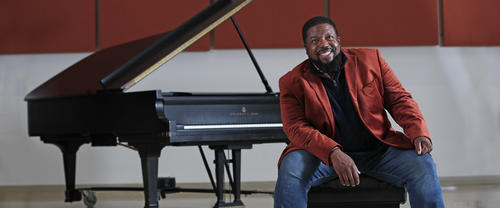
Let's sing!
As a music teacher at Roosevelt High School in south Minneapolis, Adrian Davis rebuilt the school’s decimated music program from scratch. In 2018, he took his experience teaching music education in schools further, attending the U of M and ultimately earning a PhD culminating with his dissertation, “Underrepresentation of African Americans in Music Positions at Predominantly White Institutions.”
Today he continues working in music education centered around issues of equity and diversity as the district music and arts programs facilitator for Minneapolis Public Schools and as a postdoctoral associate and music educator at the U of M. And it is at the U of M that he has begun a new endeavor—rejuvenating the U of M Gospel Choir and with it, a powerful message of peace and joy.
Davis talks about his passion and his work here and in the featured video.
On how he made his way toward music education…
I think the light officially came on for me in sixth or seventh grade, experiencing band in school for the first time. I had a great band director who really impacted me. I was able to see leadership that looked like me, a form of leadership where he was leading all sorts of people. It wasn't a singular race or a singular gender. It was all kinds of people from all different backgrounds. And that was something that was very important for me to see, because the world doesn't just look like one thing. I think it's important that the music experience should reflect what society looks like as a whole.
On getting his PhD at the U of M…
When I interviewed for my PhD studies, one of the first questions that I was asked was, “Why do you want to be at the University of Minnesota?” And my response was, “Because I live here.” That was important for me, because being a Northsider, I live 15 minutes away from this place. So whatever it is that I have to offer, I want to share it because this is my community.
Many gospel songs had their roots in slavery, and while they were meant to uplift the spirit, they were often much more than that.
These stories have spiritual connotations but they also have social ones. A lot of what we've been calling gospel was social protest. So whether the spirituality is there for you personally or not there is a social aspect that these songs, these lyrics, these chords that are being played—they are coming from a place of love, or in many cases from a place of pain. These messages are not just about God per se … but about love and peace and joy and getting along with one another and that crosses all religious backgrounds, all cultural backgrounds. Everybody wants to be loved. Everybody wants peace and joy. And that's where it's at for gospel music.
On the traditional education received in schools of music and why gospel music is an important addition to music education…
There have been centuries of dominance of the Western Anglo-Saxon European curriculum. And we should not dismiss the importance and the value of that. But anytime any type of music is being used to disqualify people or to sort people, that's when it becomes problematic—there's a social exclusion going on. Kids graduating and pursuing music at the collegiate level will find few students or mentors of color today. If it's a school of music, that means that all music is honored, all epistemologies and ontologies and ways of knowing, ways of being musically, should be honored.
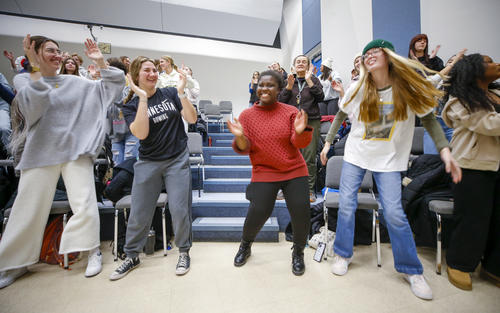
On bringing the gospel choir back to the U of M…
My goal was just to sing. Let's sing. We started out with about 15 to 16 students, and we took those 16 students, and I said, “Don't worry about the numbers. We're just going to sing our faces off, and we're going to sing with a lot of joy and with a lot of heart, and we're going to learn the history of these tunes and where they come from.” We're pushing close to 80 students now, and we're looking for 100. We're looking for 200. So come on. We want you.
The University of Minnesota Gospel Choir, directed by Dr. Adrian Davis, is open to all U of M students, faculty, staff, and alumni.
